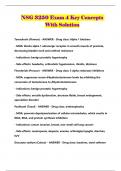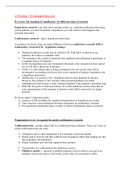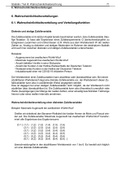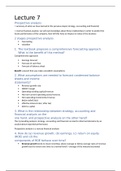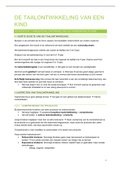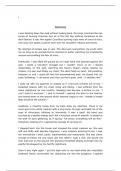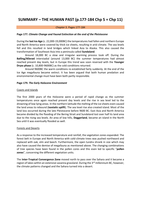HISTORIOGRAPHY
what is historiography?
• history = 'forms in which the past is recovered, thought of, and written down
• History = 'a cumulative river of events, causes and effects leading to the present day’
• historiography = history how history itself has been written, spoken of or thought about'
• not what happened, but how others have talked about their own past in antiquity
historian is always bound to a certain context
• biographical context —> this forms what kind of topics, sources, and perspective the writer
chooses
• social context —> the environment influences the writer in writing history
• context of target audience —> for who does the writer writes, this also influences the product
• context of debate —> what have others already written, what sources do they use, does the
historian use unique sources, historian is not on an island
• context of paradigms; the larger context (all of antiquity, the Middle Ages ect.)
paradigm:
• a cohesive body of views and assumptions about the purpose and interpretation of the field
• broader but well-defined frame of thought
• general approach
• historiographical “schools” (turns etc)
7 objectives of a paradigm:
1) objectives —> what is the goal of the historian
2) determinants —> major players in the work (rulers, farmers etc)
3) themes —> what is the topic of the work (the 100 years war)
4) concepts —>a compact term that provides partial questions and ideas to interpret a complex
phenomenon in a specific way; starts with modern historiography (a community, gender, how
ppl perceive the value of money)
5) methods —> how does the writer use his sources
6) sources —> anything that can be used as a source
7) style —> in what way does the writer write (prose, academic language etc)
ANTIQUITY
the earliest forms of historical writing:
• the ancient near east —> 3 millennia of christ, egypt, mesopotamia, babylonia, syria
• no coherent tradition of writing down the past
• fragmentary evidence of early forms of history writing
• long-standing explanation of events thru an alternating current of divine favour n punishment
• people had only some sense of the importance of the past
• palermo stone, 25th BC, egypt —> kings list from egypt
• eponymous chronicle 7th BC, assyria —> records of annual military campaign of assyrians
• epic poems: the illiad and odyssey, the epic of gilgamesh
• jewish historical thought
• hebrew bible —> the most important, tells us the narrative and tradition of the jewish people
which is different from the “usual” earlier narratives which concern the lineage of kings
(cyclical narrative bc it contains the rise and falls of the kings n continues with next rulers);
jewish narrative is linear, has a clear end
1 of 34
, • a linear progress through which runs a recurrent cycle of triumph n misery as god alternately
elevates or punishes his children
• greek history writing
• roman history writing
• chinese history writing
GREECE
it is with greeks that europe began to associate histories with names authors
they were the 1st ones to experiment with different historical forms n managed to transcend the
rather confining structure of annals n chronicles without abandoning chronological writing
homer:
• educational purposes
• epic poems —> a major formative influence on greek historiography
• oral tradition
• important in giving the Greeks their first sense of a historical past and a geographical place in the
world
• provided for the historians the subject matter and methods for creating historical narratives —>
the developed genre of historiography took from the Homeric poems many features of epic
• under the influence of both epics, they favored stories of persistence in the face of great
obstacles, and displayed sympathy for the sufferings of human beings on the grand as well as
the individual scale
herodotus:
• “the father of history”
• wrote a lengthy account of the greco-persian wars
• 1st person to self-identify himself a historians
• used the word “history” as the 1st one but didnt mean it in the sense we know it; more in a sense
of investigation
• he did not limit his scope to events themselves —> recorded the customs, traditions and histories
of many different ppl n states in asia that were subdued to the greeks
• claimed that his works were based on research n on critical assessment of the (primarily oral)
information he collected —> HOWEVER he was fond of tall stories; he spoke to many witnesses
n set down the truth as he believed it —> his reliability has been a controversial issue from
antiquity up tot he present
• he intervened in his own narrative to ensure that readers understood the problem of the conflicting
versions and incomplete sources
• his works owed much to the ionian tradition of geography n ethnography
• more broad-based inclusive accounts
• wide view of contemporary n past events
herodotus n his successors focused on great n admirable deeds, primarily wrought in war n politics
and n direct lively representation of action n speech is characteristic of their writings
thucydides:
• wrote an unfinished history of the peloponesian war —> came v near to making the fundamental
distinction between cause n occasion
• narrowed the scope of history to the fields of politics n warfare
2 of 34
,• tried to explain backgrounds and underlying motives through speech he put into the mouth of his
protagonists
• his work is a profound analysis of what war does to human society, penetrating as well as highly
dramatic, taxing both the intellectual capacity n the emotional stamina of the readers
• relied on spoken word much more than the written word (like herodotus) —> relied on written
sources only when he could not find a living witness
• tented to present a picture of seamless confidence that obscures the ambiguities of evidence
• 1st (western) historian to state v clearly the target audience for his text
• narrowly political accounts
• admits that he did not write the speeches word for word, they are intended to represent the
essence of what may have been said —> the practice of including speeches fulfilled an important
role within history —> words deemed as significant and influential as deeds
• invented speech also provided an important linkeage between events, it was a device which the
historian could use to enrich his account n transcend the boundaries
• implied that only those who were “insiders” to events could accurately recount those events —>
the long-practices assertion that the historians should be a “man of affairs” was born
—> followed by many greek historians of later generations
are herodotus and thucydides in the same paradigm?
no bc:
1) they r not similar enough in their 7 points of paradigm
2) their backgrounds r v different
herodotus —> perennial traveller n cosmopolitan
thucydides —> politician n unsuccessful general out of favour
after herodotus n thucydides:
late 5th c onwards —> historical writing had diversified —> histories of individual poleis and
individuals and their achievements started to emerge (xenophon, polybius); historians redirected
their attention towards individuals n their achievements + made more direct commentary on them
+ the role of the historian changed —> both a reporter and the judge of past misdeed
4th c —> universal history emerged as a new sub-genre within historiography
historians started to write histories of their own times instead of ???
the hellenistic period: biographical writing was to come to the fore
polybius:
• keen attention to identifying the causes of events
• emphasis on the practical lessons of the past
• interrupted his own accounts in places to provide reader with explicit statements on methodology
• had great influence on the course of later political history
• stressed the process of history towards the single goal of roman supremacy —> provided a model
for much later roman history
from its beginnings greek historiography had been a form of literary art written in carefully
moulded prose. until the end of antiquity, historical works written in both greek n latin were phrased
in the language taught at schools of rhetoric. the practice of putting speeches in the mouth of
historical persons was also v common. the situation resulting from these developments gave rise to
vehement discussions about the limits of historiography
3 of 34
, also practiced by greeks in the western mediterranean (5th - 3rd c BC) —> brought fruition a sub-
genre of their own covering the history of the sicilian greeks from the foundations of colonies up to
n including the authors’ times —> possibly influenced the earliest roman attempts at historiography
ROME
• some of the historians relied on polybius’ idea of historical events leading to an expanding of an
empire
• roman historical writing had several phases
• political events and the great roman empire emerging as the central themes
• around 2nd c BC history has become associated with a narrative of the past
• link between history and politics is very clear —> the rhetorical writing that was important in
roman politics was also visible in historical works
• even less interested than greeks in acquiring knowledge of the past for its own sake —> produced
little of “antiquarian” erudition bc there was little hortatory value to be derived from it
• shaping of history into the cumulative story of world events —> major innovation in roman
historiography
• had a stronger sense of the divine destiny of their city —> provided both a horizon n an
occasion fro their
• injected a teleological n progressive elements —> history become more purposeful n almost
providential among the romans —> eventually this would provide a firm foundation for
christian historiography
livy:
• “ab urbe condita” —> the history combined the annalistic approach n a continuous prose narrative
—> in a way turned the genre of local history into a variant of universal history
tacitus:
• his works were directed at the private reader
• terse, epigrammatic narrative
• “tacitean” has become an adjective to describe an entire style of writing
CHINA
—> no civilization in the world has placed as high a priority on the recording n understanding of its
past as them
—> enormous reverence for tradition
—> for a v early stage they paid tireless attention to the verification of sources
—> saw time as an agent of change rather than a vessel in which change occurred
—> chronology was conceived differently than in europe — based on frequently changed era names
rather than single chronology ab urbe condita
—> regarded the annal as the highest form
—> history was almost from the beginning connected with governance n with the ruling dynasty of
the day — YET chinese historians saw no contradiction between this n their duty to record the truth
(often at great personal risk)
—> saw historical writing as a process of compilation from earlier sources — truth was not the
conformity of the history to actual reality but its fidelity to its sources
—> consolidate a clear n consistent set of rules n practices for the representation of past
—> history was the accumulated n arrayed record of the past —> became a major category of
knowledge in 4th c BC
4 of 34
what is historiography?
• history = 'forms in which the past is recovered, thought of, and written down
• History = 'a cumulative river of events, causes and effects leading to the present day’
• historiography = history how history itself has been written, spoken of or thought about'
• not what happened, but how others have talked about their own past in antiquity
historian is always bound to a certain context
• biographical context —> this forms what kind of topics, sources, and perspective the writer
chooses
• social context —> the environment influences the writer in writing history
• context of target audience —> for who does the writer writes, this also influences the product
• context of debate —> what have others already written, what sources do they use, does the
historian use unique sources, historian is not on an island
• context of paradigms; the larger context (all of antiquity, the Middle Ages ect.)
paradigm:
• a cohesive body of views and assumptions about the purpose and interpretation of the field
• broader but well-defined frame of thought
• general approach
• historiographical “schools” (turns etc)
7 objectives of a paradigm:
1) objectives —> what is the goal of the historian
2) determinants —> major players in the work (rulers, farmers etc)
3) themes —> what is the topic of the work (the 100 years war)
4) concepts —>a compact term that provides partial questions and ideas to interpret a complex
phenomenon in a specific way; starts with modern historiography (a community, gender, how
ppl perceive the value of money)
5) methods —> how does the writer use his sources
6) sources —> anything that can be used as a source
7) style —> in what way does the writer write (prose, academic language etc)
ANTIQUITY
the earliest forms of historical writing:
• the ancient near east —> 3 millennia of christ, egypt, mesopotamia, babylonia, syria
• no coherent tradition of writing down the past
• fragmentary evidence of early forms of history writing
• long-standing explanation of events thru an alternating current of divine favour n punishment
• people had only some sense of the importance of the past
• palermo stone, 25th BC, egypt —> kings list from egypt
• eponymous chronicle 7th BC, assyria —> records of annual military campaign of assyrians
• epic poems: the illiad and odyssey, the epic of gilgamesh
• jewish historical thought
• hebrew bible —> the most important, tells us the narrative and tradition of the jewish people
which is different from the “usual” earlier narratives which concern the lineage of kings
(cyclical narrative bc it contains the rise and falls of the kings n continues with next rulers);
jewish narrative is linear, has a clear end
1 of 34
, • a linear progress through which runs a recurrent cycle of triumph n misery as god alternately
elevates or punishes his children
• greek history writing
• roman history writing
• chinese history writing
GREECE
it is with greeks that europe began to associate histories with names authors
they were the 1st ones to experiment with different historical forms n managed to transcend the
rather confining structure of annals n chronicles without abandoning chronological writing
homer:
• educational purposes
• epic poems —> a major formative influence on greek historiography
• oral tradition
• important in giving the Greeks their first sense of a historical past and a geographical place in the
world
• provided for the historians the subject matter and methods for creating historical narratives —>
the developed genre of historiography took from the Homeric poems many features of epic
• under the influence of both epics, they favored stories of persistence in the face of great
obstacles, and displayed sympathy for the sufferings of human beings on the grand as well as
the individual scale
herodotus:
• “the father of history”
• wrote a lengthy account of the greco-persian wars
• 1st person to self-identify himself a historians
• used the word “history” as the 1st one but didnt mean it in the sense we know it; more in a sense
of investigation
• he did not limit his scope to events themselves —> recorded the customs, traditions and histories
of many different ppl n states in asia that were subdued to the greeks
• claimed that his works were based on research n on critical assessment of the (primarily oral)
information he collected —> HOWEVER he was fond of tall stories; he spoke to many witnesses
n set down the truth as he believed it —> his reliability has been a controversial issue from
antiquity up tot he present
• he intervened in his own narrative to ensure that readers understood the problem of the conflicting
versions and incomplete sources
• his works owed much to the ionian tradition of geography n ethnography
• more broad-based inclusive accounts
• wide view of contemporary n past events
herodotus n his successors focused on great n admirable deeds, primarily wrought in war n politics
and n direct lively representation of action n speech is characteristic of their writings
thucydides:
• wrote an unfinished history of the peloponesian war —> came v near to making the fundamental
distinction between cause n occasion
• narrowed the scope of history to the fields of politics n warfare
2 of 34
,• tried to explain backgrounds and underlying motives through speech he put into the mouth of his
protagonists
• his work is a profound analysis of what war does to human society, penetrating as well as highly
dramatic, taxing both the intellectual capacity n the emotional stamina of the readers
• relied on spoken word much more than the written word (like herodotus) —> relied on written
sources only when he could not find a living witness
• tented to present a picture of seamless confidence that obscures the ambiguities of evidence
• 1st (western) historian to state v clearly the target audience for his text
• narrowly political accounts
• admits that he did not write the speeches word for word, they are intended to represent the
essence of what may have been said —> the practice of including speeches fulfilled an important
role within history —> words deemed as significant and influential as deeds
• invented speech also provided an important linkeage between events, it was a device which the
historian could use to enrich his account n transcend the boundaries
• implied that only those who were “insiders” to events could accurately recount those events —>
the long-practices assertion that the historians should be a “man of affairs” was born
—> followed by many greek historians of later generations
are herodotus and thucydides in the same paradigm?
no bc:
1) they r not similar enough in their 7 points of paradigm
2) their backgrounds r v different
herodotus —> perennial traveller n cosmopolitan
thucydides —> politician n unsuccessful general out of favour
after herodotus n thucydides:
late 5th c onwards —> historical writing had diversified —> histories of individual poleis and
individuals and their achievements started to emerge (xenophon, polybius); historians redirected
their attention towards individuals n their achievements + made more direct commentary on them
+ the role of the historian changed —> both a reporter and the judge of past misdeed
4th c —> universal history emerged as a new sub-genre within historiography
historians started to write histories of their own times instead of ???
the hellenistic period: biographical writing was to come to the fore
polybius:
• keen attention to identifying the causes of events
• emphasis on the practical lessons of the past
• interrupted his own accounts in places to provide reader with explicit statements on methodology
• had great influence on the course of later political history
• stressed the process of history towards the single goal of roman supremacy —> provided a model
for much later roman history
from its beginnings greek historiography had been a form of literary art written in carefully
moulded prose. until the end of antiquity, historical works written in both greek n latin were phrased
in the language taught at schools of rhetoric. the practice of putting speeches in the mouth of
historical persons was also v common. the situation resulting from these developments gave rise to
vehement discussions about the limits of historiography
3 of 34
, also practiced by greeks in the western mediterranean (5th - 3rd c BC) —> brought fruition a sub-
genre of their own covering the history of the sicilian greeks from the foundations of colonies up to
n including the authors’ times —> possibly influenced the earliest roman attempts at historiography
ROME
• some of the historians relied on polybius’ idea of historical events leading to an expanding of an
empire
• roman historical writing had several phases
• political events and the great roman empire emerging as the central themes
• around 2nd c BC history has become associated with a narrative of the past
• link between history and politics is very clear —> the rhetorical writing that was important in
roman politics was also visible in historical works
• even less interested than greeks in acquiring knowledge of the past for its own sake —> produced
little of “antiquarian” erudition bc there was little hortatory value to be derived from it
• shaping of history into the cumulative story of world events —> major innovation in roman
historiography
• had a stronger sense of the divine destiny of their city —> provided both a horizon n an
occasion fro their
• injected a teleological n progressive elements —> history become more purposeful n almost
providential among the romans —> eventually this would provide a firm foundation for
christian historiography
livy:
• “ab urbe condita” —> the history combined the annalistic approach n a continuous prose narrative
—> in a way turned the genre of local history into a variant of universal history
tacitus:
• his works were directed at the private reader
• terse, epigrammatic narrative
• “tacitean” has become an adjective to describe an entire style of writing
CHINA
—> no civilization in the world has placed as high a priority on the recording n understanding of its
past as them
—> enormous reverence for tradition
—> for a v early stage they paid tireless attention to the verification of sources
—> saw time as an agent of change rather than a vessel in which change occurred
—> chronology was conceived differently than in europe — based on frequently changed era names
rather than single chronology ab urbe condita
—> regarded the annal as the highest form
—> history was almost from the beginning connected with governance n with the ruling dynasty of
the day — YET chinese historians saw no contradiction between this n their duty to record the truth
(often at great personal risk)
—> saw historical writing as a process of compilation from earlier sources — truth was not the
conformity of the history to actual reality but its fidelity to its sources
—> consolidate a clear n consistent set of rules n practices for the representation of past
—> history was the accumulated n arrayed record of the past —> became a major category of
knowledge in 4th c BC
4 of 34


